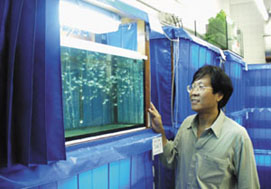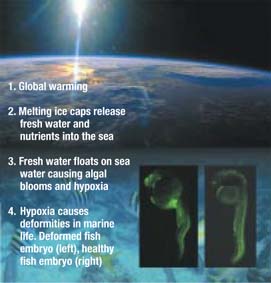
Issue No 10: August 2005
![]()
Pollution
and global warming combine to devastate
reproductive ability of marine species
![]()
Reduced oxygen in the world’s
oceans is causing sex changes and deformities in fish and other marine life,
and is leading to a potential ecological disaster, researchers at the City
University of Hong Kong warn.
![]() Within
a few years, says Principal Investigator Prof Rudolph Wu, some species
could be virtually wiped out.
Within
a few years, says Principal Investigator Prof Rudolph Wu, some species
could be virtually wiped out.
Oxygen
starvation in water, or hypoxia, is caused by both human activities and
natural phenomenon.

Prof Wu with fish being prepared for his
hypoxia research

Whelks,
already a gender imbalance

![]() Pollution
from sewage and agricultural activities can lead to hypoxia in coastal waters.
But added to the problem of coastal pollution are the results of global
warming which are affecting vast areas of oceans.
Pollution
from sewage and agricultural activities can lead to hypoxia in coastal waters.
But added to the problem of coastal pollution are the results of global
warming which are affecting vast areas of oceans.
![]() “With
the ice caps melting, there are large inputs of fresh water into the sea
which, because it’s
not as dense as salt water, sits on top and prevents oxygen exchange,”
said Prof Wu. “The fresh water also adds nutrients which lead to algal
blooms and an increased demand for oxygen,” he added.
“With
the ice caps melting, there are large inputs of fresh water into the sea
which, because it’s
not as dense as salt water, sits on top and prevents oxygen exchange,”
said Prof Wu. “The fresh water also adds nutrients which lead to algal
blooms and an increased demand for oxygen,” he added.
![]() In
recent years, scientists have been concerned that chemicals known as endocrine
disruptors, although occurring in concentrations as low as parts in a trillion,
can be enough to disturb the normal balance and change the sex status of
a marine creature, said Prof Wu.
In
recent years, scientists have been concerned that chemicals known as endocrine
disruptors, although occurring in concentrations as low as parts in a trillion,
can be enough to disturb the normal balance and change the sex status of
a marine creature, said Prof Wu.
![]() Prof
Wu’s
research has shown, for the first time in science, that hypoxia
is also an endocrine disruptor, meaning that it interferes with functions
of the glands that secrete sex hormones. For example, it inhibits the production
of the female hormone oestrogen which stimulates the development of female
reproductive organs and promotes female sexual characteristics.
Prof
Wu’s
research has shown, for the first time in science, that hypoxia
is also an endocrine disruptor, meaning that it interferes with functions
of the glands that secrete sex hormones. For example, it inhibits the production
of the female hormone oestrogen which stimulates the development of female
reproductive organs and promotes female sexual characteristics.
![]() In
male fish, he showed that hypoxia led to the depletion of the male hormone
testosterone which caused a decline in fertilisation capabilities.
In
male fish, he showed that hypoxia led to the depletion of the male hormone
testosterone which caused a decline in fertilisation capabilities.
![]() Prof
Wu demonstrated the changes using carp and zebra fish and simulating hypoxic
conditions by introducing nitrogen into fish tank water, depleting the level
of oxygen from a normal 7 parts per million to 1 part per million.
Prof
Wu demonstrated the changes using carp and zebra fish and simulating hypoxic
conditions by introducing nitrogen into fish tank water, depleting the level
of oxygen from a normal 7 parts per million to 1 part per million.
![]() After
six to eight weeks, levels of the sex hormones oestradiol and testosterone
in both female and male fish were only 20 percent of those in normal fish.
After
six to eight weeks, levels of the sex hormones oestradiol and testosterone
in both female and male fish were only 20 percent of those in normal fish.
![]() The
reproductive processes and output of the fish were seriously affected; whereas
an average of 92 percent of eggs from normal fish successfully hatched,
the survival of eggs from oxygen-deficient fish dropped dramatically to
4 per cent.
The
reproductive processes and output of the fish were seriously affected; whereas
an average of 92 percent of eggs from normal fish successfully hatched,
the survival of eggs from oxygen-deficient fish dropped dramatically to
4 per cent.
![]() Prof
Wu also demonstrated that hypoxia is a teratogen, causing stunted growth
and malformation during embryonic stages.
Prof
Wu also demonstrated that hypoxia is a teratogen, causing stunted growth
and malformation during embryonic stages.
![]() Malformations
included the lack of a vascular system, changes in apoptosis (the programmed
death of cells), and an altering of the expression of genes controlling
sex differentiation and development.
Malformations
included the lack of a vascular system, changes in apoptosis (the programmed
death of cells), and an altering of the expression of genes controlling
sex differentiation and development.
![]() The
change of sex in marine species as diverse as crocodiles and sea snails
by chemical endocrine disruptors has been noted by scientists for some time,
with dominant gender orientation being male. Said Prof Wu: “Reproductive
impairments could lead to population decline and extinction of species in
the long run. In the coming years, hypoxia is going to get worse because
of the effects of global warming. What we are tackling is a global problem
that is highly relevant to Hong Kong. Globally, it could be a real disaster.”
The
change of sex in marine species as diverse as crocodiles and sea snails
by chemical endocrine disruptors has been noted by scientists for some time,
with dominant gender orientation being male. Said Prof Wu: “Reproductive
impairments could lead to population decline and extinction of species in
the long run. In the coming years, hypoxia is going to get worse because
of the effects of global warming. What we are tackling is a global problem
that is highly relevant to Hong Kong. Globally, it could be a real disaster.”
Principal
Investigator
Prof Rudolf S S Wu : bhrswu@cityu.edu.hk